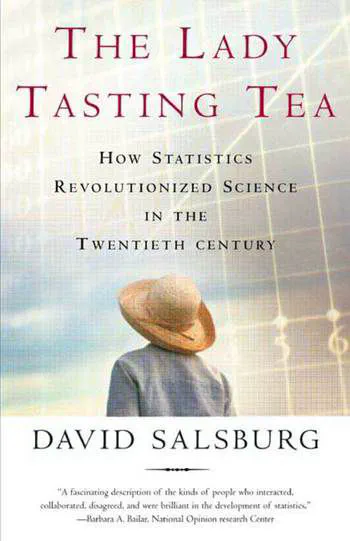The Lady Tasting Tea Note 1
 Image credit: Macmillan
Image credit: MacmillanFirst of all, I want to say I’m not a “note” person, so I don’t want to really write a note with my interpretations and insights of something. However, for everyone who is interested in Statistics, I recommend this book to you. David Salsburg uses a lot of famous statisticians’ stories to introduce popular methods and definitions in Statistics, and you will find many big discussions in the history of Statistics which almost no one talk about now. No matter whether all the stories in the book are correct or not, they give me a clear view of the development of the modern Statistics.
This book was first introduced to me by Prof. Xin Liu when he taught the course introducing Statistics at Donghua University. At that time, I didn’t know the content of this book but I’ve heard of the Chinese translater, Prof. Dong Qiu, who once was the chancellor of my parents’ university. So I found the book but haven’t read it until I went to US for my master program.
Though I started reading this book few years ago, I always stopped after first few chapters since I was quite busy with my coursework and didn’t have a detailed plan about reading. So I picked it up and put it down for several times until recently. I found that many PhDs or professors have a book list in their blogs, and I feel I need a lot of extra knowledge to improve my theoretical foundation after STAT 900. So I picked this book up again, and I have read more than half of it for now. Though it is not a textbook or a theoretical book, I learned a lot of ideas about how the methods proposed at the beginning, even how did the first generation of modern statisticians think about this world.
There is no doubt that Fisher plays an important role in the modern Statsitics and this book. Almost half of the book is about Fisher. You will know his bad eyesight not only gave him thick glasses, but also his unusual geometric insights. He was a genius who contributed a lot in Statistics but also made a lot of “enemies”. Well, such a person in history always gets a mixed reception. For Fisher, just look at his contribution, not his personality, or you will surely feel his acerbity and superiority.
Let me finish with a story in the book. Jerzy Neyman was attacked constantly by Fisher until Fisher died in 1962, but he never responded. Neyman once presented a paper in French at an international meeting, and Fisher was in the audience. Neyman knew that Fisher would attack him on some unimportant minor aspect of the paper and “tear it and Neyman to pieces”. However, when he finished and waited for questions, Fisher didn’t say anything. Later Neyman discovered that Fisher couldn’t speak French. Think about the big “battle” between Fisher and Neyman-Pearson. If I were Neyman, I don’t know if I would have the confidence to battle with Fisher under this pressure.